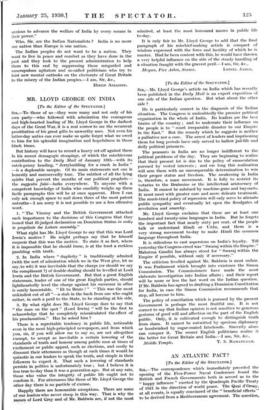MR. LLOYD GEORGE ON INDIA
[To the Editor of the SPECTATOR.]
SIR,—To those of us—they were many and not only of his own party—who followed with admiration the courageous and high-hearted leading of Mr. Lloyd George in the darkest days of the Great War, it is a real sorrow to see the recurrent prostitution of his great gifts to unworthy uses. Not even his latter-day antics can ever make us quite forget what we owed to him for his splendid imagination and hopefulness in those black times.
But history will have to record a heavy set-off against these in his recent demagogic stoopings, of which the mischievous contribution to the Daily Mail of January 18th—with its catch-penny heading, " Jerrybuilding for a crash in India " —is a deplorable sample. Of its main statements not one is honestly and unreservedly true. The subtlest of all the lying spirits that pervert the mouths of our political prophets— the suggestio faLti—lurks everywhere. To anyone with a competent knowledge of India who candidly weighs up these facile paragraphs this will be at once apparent. Here I can only ask enough space to nail down three of the most patent untruths—I am sorry it is not possible to use a less offensive word.
1. " The Viceroy and the British Government attached such importance to the decisions of this Congress that they issued that ill-judged declaration on Dominion Status in order to propitiate the Lahore assembly."
What right has Mr. Lloyd George to say that this was Lord Irwin's motive ? He might perhaps say that he himself suspects that this was the motive. To state it as fact, where it is impossible that he should know, is at the least a reckless gambling with truth.
2. In India where " duplicity " is traditionally admired (with the sort of admiration which we in the West give, let us say, to wit) it was inevitable that the charge (or should we say the compliment ?) of double-dealing should be levelled at Lord Irwin and the British Government. But that a great English statesman, leader of one of the great English parties, should lightheartedly level the charge against his successor in office is surely lamentable. " Et to Brute ! " " This was the most unkindest cut of all "—a stab in the back from one who ought rather, in such a peril to the State, to be standing at his side.
3. By what right does Mr. Lloyd George dare to say that " the man on the spot " (Lord Irwin) " will be the first to acknowledge that he completely miscalculated the effect of his proclamation." Has he asked him ?
There is a regrettable tendency in public life, noticeable even in the most high-principled newspapers, and from which you, sir, if you will allow me to say so, are not altogether exempt, to accept as inevitable a certain lowering of the standards of truth and honour among public men at times of excitement or public appeal, such as elections, and coolly to discount their utterances as though at such times it would be quixotic in our leaders to speak the truth, and simple in their followers to expect it. That such a lowering of standards persists in politics is unfortunately true ; but I believe it is less true to-day than it was a generation ago. But at any rate, those who value the integrity of public life ought not to condone it. For utterances like those of Mr. Lloyd George the other day there is no particle of excuse.
Happily there are honourable exceptions. There are some of our leaders who never stoop in this way. That is why the names of Lord Grey and of Mr. Baldwin are, if not the most admired, at least the most honoured names in public life to-day.
It is only fair to Mr. Lloyd George to add that the final paragraph of his mischief-making article is compact of wisdom expressed with the force and lucidity of which he is master. Had he been content with this, he would have thrown a very helpful influence on the side of the steady handling of a situation fraught with the gravest peril.—I am, Sir, &c.,






































 Previous page
Previous page